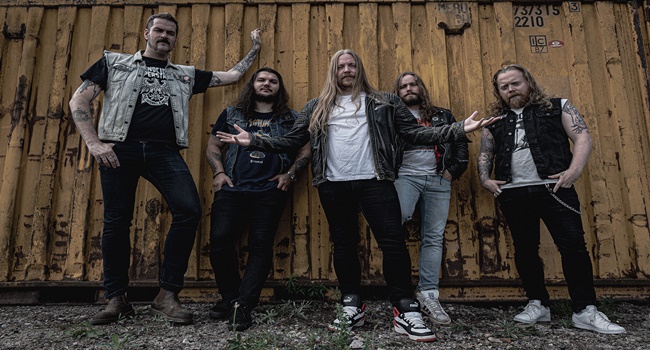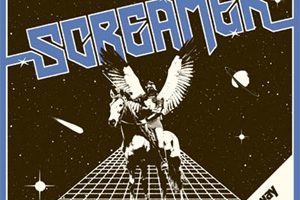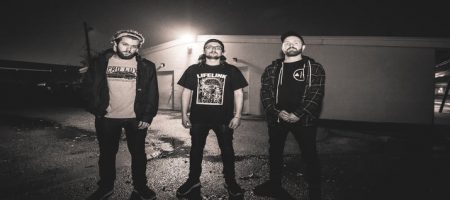Screamer – All Hail the Kingmaker
Thursday, 5th January 2023
Fervent fanatics of traditional heavy metal love the tried-and-true staples of the 70’s and 80’s – yet we all know for this subgenre to thrive, there needs to be younger blood willing to create material for this current generation to savor. Enter Swedish act Screamer as one of those reliable bands since arriving on the scene in 2009 that deliver hymns of steel, anthems sure to go down a storm across stages small or large. Moving up the ranks to SPV/Steamhammer for this fifth studio album Kingmaker, the record contains all the requisite catchy melodies, headbanging riffs, and pocket rhythm section work that people into Iron Maiden, Judas Priest, Accept, on through to Riot V or Hammerfall find favorable.
We reached out to drummer Henrik Petersson through Skype recently to learn more about the evolution of the band’s sound, signing with SPV/Steamhammer and how that has improved their profile, thoughts on the heavy metal scene in general and establishing newer bands with their own take/style, artwork/video thoughts, plus future plans including more North American tour dates.
Dead Rhetoric: What are some of your earliest memories surrounding music growing up in childhood? At what point did you start listening to hard rock/heavy metal, and eventually pick up an interest in the drums to start playing in bands?
Henrik Petersson: We have this local punk band that were hometown heroes, and I got to see them with my brothers when I was seven or eight. I had a lot of music at home, and my friend’s dad he had a drum kit so that was the best thing ever. When I was thirteen or fourteen, I started playing the drums, and in that same year I went to see Hammerfall on the Renegade tour with Virgin Steele and Freedom Call. From there I was a full-blown metalhead.
I started as a self-taught musician for a couple of years, and then I went to a musical-oriented high school. I had lessons for three years, not only the drums but for music theory in general. Played bass for a while, a lot of choir singing. A lot of this just ended up being for fun.
Dead Rhetoric: You started Screamer in 2009 – what do you remember about those initial rehearsals, songwriting sessions, and vision/dream you had for what you wanted to develop with this band?
Petersson: The main goal from the start, what we met around, we wanted to play the music that we enjoy listening to, drinking beer while listening to it, communicating a good time. The second objective was we were not going to just be a rehearsal space band. We had all been doing that for a long while. Meeting up on a Tuesday and Thursday, but not actually get out and play. The full focus from the start was going out to play – and it was a lot of fun to jam everything with the songwriting. It wasn’t like someone came with five songs already written – we went into the rehearsal space for seven or eight hours at a time and jammed, played and played. That was a big difference from anything I’ve ever done before.
Dead Rhetoric: Do you think the natural chemistry and hard work ethic made things easier for Screamer to develop your own style?
Petersson: From the beginning, yeah, definitely. It was also music-wise, it’s where we met. We are punk, we are metalheads, we are hard rockers, but we have the more traditional way with heavy metal. We didn’t want to be just speed metal, some of our influences are there of course, but it felt very natural. As we have developed over the years, it’s just me and Dejan left from the first album now, our old singer left and Andreas has been our singer on the last three albums, that’s more like we have matured. We work differently with songwriting now, but we have the essence of what we are doing with the last two records. We are learning how to focus things down, not to be so widespread with the music we are doing. Even though it is widespread, you get the core of Screamer within every song, I think.
Dead Rhetoric: Kingmaker is fifth and latest studio album for Screamer. Tell us how you gained the interest of Steamhammer/SPV after being on High Roller and The Sign for previous record deals – and where you see the major difference in this set of material compared to your previous discography?
Petersson: I have been talking to Olly at SPV since Hell Machine, I think. We wanted to try something new, so after Hell Machine we went with The Sign Records, a Swedish label. In hindsight, that was kind of a sidestep, but we learned a lot about what we are doing and how everything works. We got the possibility to go to SPV/Steamhammer, it’s only the first record with them but it seems like the second month of promotion for the album, it’s bigger, it’s smoother, we are working with absolute professionals. We realized we have been fortunate to line up with the right record label, brand new worlds are opening up to us. It’s a bit more pressure than we want to do right by ourselves, to live up to their expectations. It’s a lot of fun when you get that feedback from people all the time, for the last album we did maybe three interviews for the entire album cycle. That’s a big difference now, already in the press reach, which I find to be very satisfying.
Dejan and I, when we started laying down the groundwork for the new album, we had no compromises. We leveled up everything in steps compared to what we had done before. With production, approach, work ethic as well. We got a lot of tools from working with our friend Gustav Hjortsjö. He helped us produce Highway of Heroes. When we went for pre-production for Kingmaker, we went to Jakob Herrman, who has worked in the past with In Flames, Evergrey, a lot of very big acts. I wanted another fresh perspective on things production-wise. We realized we had evolved and become quite good songwriters by now. You can mix that with influence from people you trust, I feel like we have our strongest album to date. We feel very confident that we have done the best that we can do now. No compromises. We went with what we had planned from the beginning. We are proud of this. This is a natural progression for Screamer, in a good way. We are tying up loose ends. We are already halfway done with the next album as well. We know we have landed, and we are gaining consistency.
Dead Rhetoric: You’ve released two singles/videos to date for the title track and “Hellfire” – directed by Max Ljungberg. How do you feel the video shoots went, and where do you see the importance of the visual medium in expanding the brand and promotion of Screamer – given the social media platforms on hand?
Petersson: I think the visual is key, because that’s what we want to communicate. Since we started working with Max, we’ve done four videos with him. We are from a super small factory town, and its world famous. We try to get that and incorporate it into the music, as this is still heavy metal music. We are a steel city band; we want to get that visual. It works really well with the denim and leather, big forklifts over the junkyards. It’s important to have that when presenting your band, instead of just standing around performing in your rehearsal room, which is not wrong, but the viewer doesn’t really know what we are communicating at all. For the title track “Kingmaker” we tried to make our mascot the demon rider into flesh with the wasteland pirates / warriors. Mad Max LARP-ing basically, but we think we have a fun thing that we can build into a story coming up ahead. It goes with the shirts we make, how we want to look on stage and what we are doing. Everything it’s connected, it’s important to realize that even when you are not a major band, it’s important for the underground bands as well.
Dead Rhetoric: David Paul Seymour did the cover art again, whom you worked with previously on your Live Sacrifice album from 2021. How did the process work between the band and David, and discuss your thoughts on the importance of striking cover art within heavy metal over the years?
Petersson: With David, it was a lot of fun. I had listed some ideas of what we wanted, tossed that back and forth with Andreas the singer as he writes 90% of the lyrics. We all needed to have that discussion. We talked to David, we are not a fantasy band, and we are not a concept band, it still has to be reflected in the cover art everything that you can visualize within the songs. If you know the lyrics, it’s always to be interpreted by the listener, but it has to fit the artwork, a bit. The visual of a heavy metal album is super important. A lot of art now is minimalistic, but heavy metal is not minimalistic, it’s an abundance of everything. Yngwie Malmsteen says more is more. It’s hard, but you need to find that balance in that. You want people to see this cover and think, okay – I am going to like this music. It’s as important as presenting yourself with high quality videos, to illustrate what you are doing.
Dead Rhetoric: I agree. I am in my early fifties, and I grew up in an era where a lot of times we never could preview a single before an album hits the streets. You had to depend on the cover art if you didn’t know the band to feel like this would be reflective of what you would hear when you played the record…
Petersson: Yeah, exactly. I think people still go to record stores, and they can shop by cover as well. It’s about getting the attention as well. My older brother had Iron Maiden- Live After Death. I don’t know how many times I drew the Iron Maiden logo, with all the lightning, I remember drawing this countless times. It’s important even when you are a child, or 38 like I am. It binds everything together.
Dead Rhetoric: You also perform multiple duties in the band as a manager and organizational backbone. How have you been handling the division between your musical and business responsibilities – are there times where you have thought about seeking out bigger or different management, or do you believe you are better off continuing in a self-contained manner?
Petersson: Sometimes it’s very goddamned hard. Sometimes I just want to play drums. People have offered to do stuff for us, but when they present their ideas – they always say, we want 25%. They better be really good – and they don’t present anything new, they are things that I can do. They present ideas of things we were doing five years ago; can you bring something new to the table for us? It’s better for the band if I do this in collaboration with our production agency, booking agency, and the record label. Then it’s directly with the band. You don’t need a manager until you know that you need a manager outside the band. That’s not a clear answer, but you shouldn’t go get a manager because of the fact of having a manager. That won’t do you any favors, and it will only cost you money.
Dead Rhetoric: At this point, it’s been proven that bigger bands like Overkill and Sabaton can self-manage to do excellent business on a high level…
Petersson: Sabaton is our role model for every band that wants to do things DIY. I may not be a fan of everything the band has done, but I can read interviews with Pär the bass player about the organizational side of everything, it’s jaw-dropping impressive. You can do it; you just have to commit to rock.
Dead Rhetoric: What do you consider some of the most important memories or activities in the career of Screamer – specific albums, tours, festival appearances, or other actions where you knew you were making more of an impact with your music?
Petersson: I would say the first tour we did with Bullet in 2012, that was one of the most important tours we did as a newcomer. We hadn’t put out our second album, we got to play in front of 500 people a night. Even though it’s a long time ago. Playing the Rock Hard festival, Summer Breeze, annual highlight of Muskelrock. It’s a traditional metal festival, when we are not playing, we are working there every year, helping out in the background, lurking in the shadows. We got to tour the US this year, that was an eye-opener as well. We will do that again, so we have at least two continents to focus on going forward. The journey is the goal with a lot of things, even as we get older, a bit pickier, as we should be. There is so much in the grand scheme of everything. The biggest highlight is yet to come with getting Kingmaker released.
Dead Rhetoric: How would you describe your personal approach to the drums – and who are some of your favorite influences past and present that inspire you?
Petersson: Personal approach to drumming is that you have to play with the band. That sounds perhaps self-explanatory. Drummers can sometimes take up a lot of space and do a lot of things they don’t need to do, forgetting to keep the beat. I don’t have that approach. If it’s my limits or personal tastes, I think it’s a bit of both. Because I still love Nicko McBrain’s drumming, even though it’s all over the place all the time. I still think Tommy Lee lays down the most solid grooves you can on the drums. And it’s two opposite worlds. Serving the song is where I have been going hard on for the last five, six years. If you want to play hard rock, heavy metal – you have to hit hard and you have to communicate that when you play, not being a stupid maniac. You have to channel the intensity into your drums as well. I can get pissed off when I see a heavy metal band and the drummer is barely touching the drums, because they are not communicating the intensity towards me.
For fast drumming, Dave Lombardo is my god. For power and heavy metal, it’s Anders Johansson from Hammerfall, Silver Mountain, he played with Yngwie as well. Dave Holland in his minimalistic way of playing, Nicko McBrain in his all over the place playing. That sums up heavy metal drumming for me, if you put all of those four players together.
Dead Rhetoric: What are your thoughts on the current state of heavy metal in Sweden as well as globally? What do you enjoy most about the scene, and what changes (if any) would you like to see modified or improved upon?
Petersson: Heavy metal seems to be… when we started out, there were a lot of bands, but there really wasn’t any consistency. It was new bands, they would release an EP, and then most of them went away. And now perhaps, it’s a lot of really good bands that know what they are doing, there are a lot of younger bands that are so energetic. Sometimes my own thought about it, some of the bands, they are turning into tribute bands like an Accept or Judas Priest tribute band instead of really focusing on carving your own way in this super narrow path that is traditional heavy metal. That’s what I can feel is lacking sometimes.
I’m genre fluid and all over the place when it comes to listening to music. There are only a few of the new heavy metal bands that you can instantly recognize when you hear the guitar tone, that’s that band. It’s easier said than done. That’s my thoughts about it.
Dead Rhetoric: That is the challenge. Heavy metal has been in existence for fifty years, to carve out your own unique take and style on it, it can be difficult but achieved. You just have to put in the work ethic to do it.
Petersson: Definitely. And I’m not talking about reinventing the wheel or anything. One of the best new heavy metal records in the 2000’s is Enforcer – Zenith, because they did what they wanted to do on that album, and it’s dynamic. The fans hate that though, they want them to sound like the first album. At least online. I read comments. They did something cool here, why do you not like that? The reception from people, it may be nostalgia, but people want to hear the same thing on every album. I for one do not want that.
Dead Rhetoric: How has a failure set you up for a later success when it comes to Screamer? And when it comes to your own personal setbacks or failures, what types of things do you do to push through?
Petersson: Don’t know if we have had failures by that definition. We’ve definitely done a lot of tours and shows that we shouldn’t have done. We know that in the heavy metal world, because of doing that, it has helped us out further down the road. Getting a festival slot, or getting a place to crash, the van breaks down, you have friends in almost every city across Europe. It’s perhaps not a clear example of what you are asking for, but the hard work has paid off in so many ways. We are well over 400 shows, and there are some duds, but we are a touring band.
It spills into the personal life as well. I am not a quitter, I endure, and I push through. It’s rough sometimes, but I push through, that’s not the way I’ve been raised. That’s also typical of people from our region here in Sweden, we are hard working. It reflects a lot in our music.
Dead Rhetoric: What’s on the schedule for Screamer related activities over the next twelve months to support the new album?
Petersson: We are going out on a European tour in April. Towards the fall, we have another North American tour, on the Eastern part of the country. We did California and Texas the last time, and we did a Midwest tour, we want to do the other parts of the states. We have other stuff in the pipeline. We have plans for at least sixty shows this coming year. And we will see what happens, maybe another music video in the spring to promote the tour. The working plan at the moment, we hope the demos are done for the next album before the spring tour – and we can get the album release eighteen months after that. Because we have to be realistic, we all work full-time. We don’t want to burn ourselves at both ends. We have a more sober approach to touring now. What is possible and reasonable. It won’t be a long gap until you get new music from Screamer. We want to keep it at an album every two to two and a half years. I think that’s reasonable.

























